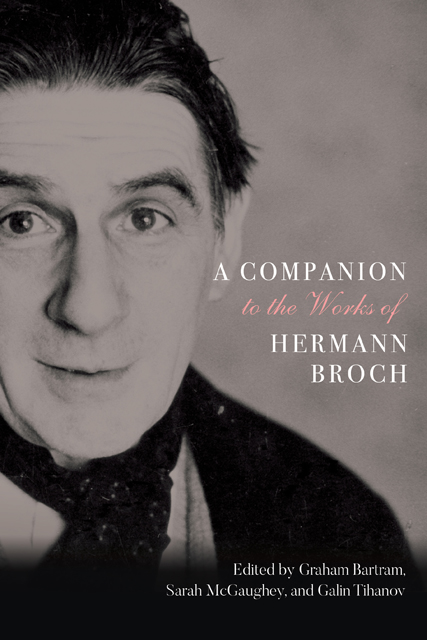Book contents
- Frontmatter
- Contents
- Preface
- Acknowledgments
- List of Abbreviations
- Introduction: Broch’s Life and Works
- 1 Perspectives on Broch’s Die Schlafwandler: Narratives of History and the Self
- 2 Hermann Broch and the Dilemma of Literature in the Modern Age
- 3 Interrogating Modernity: Hermann Broch’s Postromanticism
- 4 Broch and the Theater: Die Entsühnung and Aus der Luft gegriffen as Tragic and Comic Dramatizations of the Economic Machine
- 5 Limits of the Scientific: Broch’s Die Unbekannte Größe
- 6 Broch’s Die Verzauberung: Ludwig Klages and the Bourgeois Mitläufer
- 7 Hermann Broch’s Massenwahnprojekt and Its Relevance for Our Times
- 8 Human Rights and the Intellectual’s Ethical Duty: Broch’s Political Writings
- 9 Broch’s Der Tod des Vergil: Art and Power, Language and the Ineffable
- 10 From the “Tierkreis-Erzählungen” to Die Schuldlosen: The Creation of Broch’s Last Novel
- 11 Broch’s Legacy and Resonance
- Selected Bibliography
- Notes on the Contributors
- Index
3 - Interrogating Modernity: Hermann Broch’s Postromanticism
Published online by Cambridge University Press: 20 January 2023
- Frontmatter
- Contents
- Preface
- Acknowledgments
- List of Abbreviations
- Introduction: Broch’s Life and Works
- 1 Perspectives on Broch’s Die Schlafwandler: Narratives of History and the Self
- 2 Hermann Broch and the Dilemma of Literature in the Modern Age
- 3 Interrogating Modernity: Hermann Broch’s Postromanticism
- 4 Broch and the Theater: Die Entsühnung and Aus der Luft gegriffen as Tragic and Comic Dramatizations of the Economic Machine
- 5 Limits of the Scientific: Broch’s Die Unbekannte Größe
- 6 Broch’s Die Verzauberung: Ludwig Klages and the Bourgeois Mitläufer
- 7 Hermann Broch’s Massenwahnprojekt and Its Relevance for Our Times
- 8 Human Rights and the Intellectual’s Ethical Duty: Broch’s Political Writings
- 9 Broch’s Der Tod des Vergil: Art and Power, Language and the Ineffable
- 10 From the “Tierkreis-Erzählungen” to Die Schuldlosen: The Creation of Broch’s Last Novel
- 11 Broch’s Legacy and Resonance
- Selected Bibliography
- Notes on the Contributors
- Index
Summary
Broch and romanticism has by now become almost a subfield of research, one that is crucial to our understanding of Broch’s place in the cultural history of his era.Yet we still lack a comprehensive account of how Broch positioned himself, through immersion but also distantiation, vis-à-vis Romanticism, searching for a specific location within what one must see as a postromantic intellectual and artistic landscape. If anything, Broch’s work, above all his magisterial novel Die Schlafwandler, presents a fully fledged interwar embodiment of postromanticism as what we may call a complex discursive formation—“complex” in the sense that it self-consciously orients itself toward, and involves, another, past (yet far from dead) discursive formation (the “historic” Romanticism of the late eighteenth and early to mid-nineteenth centuries). But how should one define postromanticism, and why should one seek to interpret Broch’s novel as an iteration of this particular discursive formation? To begin to answer these questions, in the first part of this chapter I make the case for the significance of postromanticism and its differentiation from both Romanticism and aesthetic and ideological formations such as neoromanticism;doing so amounts to recovering and articulating a previously underreflected cultural phenomenon that could best be captured as a syndrome of both returning to, but also fleeing from, Romanticism, of acknowledging its ineluctable and continuous presence but also, in the same breath, critiquing it through numerous creative gestures of realignment and (dis)continuation. In the second part of the chapter I detail and substantiate this phenomenon through closer examination of Broch’s major novel and also with reference to some of his essays. I endeavor to establish the semantic compass of the appellation “romantic” in the essays and in the trilogy, to analyze the way in which the trilogy parodies and undermines two central Romantic motifs, and, finally, to position Die Schlafwandler in the wider framework of a postromantic interrogation of modernity that highlights the problematic confluence of rationality and irrationality since the Reformation.
The Postromantic Syndrome
Romanticism occupied a unique place in the cultural formation of modernity. Not only did Romanticism enjoy—like so many artistic currents from the eighteenth century onward—a resurrection in periods of imitation and emulation in literature, music, and the arts; unlike all later currents, Romanticism became an attitude, a wider cultural reality—one might even say a lifestyle.
- Type
- Chapter
- Information
- A Companion to the Works of Hermann Broch , pp. 73 - 90Publisher: Boydell & BrewerPrint publication year: 2019



